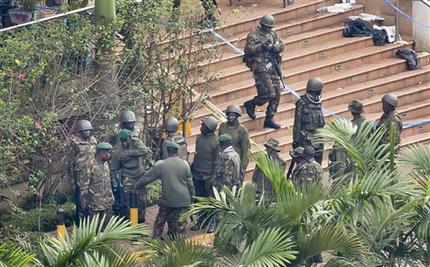NAIROBI, Kenya (AP) — The Islamic extremist group that killed scores of people at a Nairobi mall has now attacked two Kenyan towns near the Somali border, killing three people. The leader of the Somali group affiliated with al-Qaida said the attacks will continue until Kenyan troops are withdrawn from Somalia.

The leader of al-Shabab said in a message that there is no way Kenya can “withstand a war of attrition inside your own country.”
“Make your choice today and withdraw all your forces,” said Ahmed Abdi Mohamed Godane, who goes by his nom de guerre Mukhtar Abu Zubayr, in a new statement posted on the Internet late Wednesday. “Otherwise be prepared for an abundance of blood that will be spilt in your country, economic downfall and displacement.”
Al-Shabab said the Nairobi mall attack was not only directed at Kenya, but was also “a retribution against the Western states that supported the Kenyan invasion and are spilling the blood of innocent Muslims in order to pave the way for their mineral companies,” according to the statement from Godane.
Al-Shabab attacked Nairobi’s upscale Westgate mall Saturday and held it for four days in a siege in which at least 67 people were killed. Forensic experts from around the world, including the U.S., Britain, Germany and Canada, continued their work Thursday reconstructing events in the crime scene including by carrying out fingerprint, DNA and ballistic analysis.
Early Thursday, Al-Shabab fighters attacked the border town of Mandera, killing two police officers, injuring three others and destroying 11 vehicles, said regional police chief Charlton Mureithi.
Wednesday night, al-Shabab attacked the border town of Wajir, 390 kilometers (240 miles) southwest of Mandera. One person was killed and four wounded after a gunman opened fire and threw grenades.
Kenya has suffered many such attacks by al-Shabab along its 682 kilometer (423 mile) border with Somalia but they take on new significance following the Westgate Mall attack.
Experts from the U.S., Germany, and the international police agency Interpol were seen entering and leaving the Nairobi city morgue where bodies recovered from the mall have been taken. Two British pathologists were working with their Kenyan counterparts inside performing autopsies, a senior morgue official said on condition of anonymity because he was not authorized to speak with the press.
Bullets and shrapnel being removed from the corpses are being turned over to police as evidence, chief government pathologist Johansen Oduor told the AP.
“A lot of them died from bullet wounds – the body, the head, all over,” he said. “Some also died from grenades, shrapnel.”
He refused to say how many bodies were in the morgue but did say that he was told to expect more – though would not say how many.
The Kenyan Red Cross said Thursday that 61 people remain missing and many worry that they may be buried under the rubble in the mall – though the government has said they do not believe there are many more victims inside. The Red Cross earlier said 71 people were missing, but that number has reduced as bodies in the morgue have been identified.
The international investigation is being coordinated by Interpol, which sent an incident response team that arrived in Nairobi on Wednesday, the Kenyan government said.
The Interpol team includes disaster victim identification and data specialists who will carry out real-time comparisons of evidence collected inside the mall against the France-based agency’s database on DNA and fingerprints from its 190 member country network, said Interpol official Jean-Michel Louboutin.
“Whether it be through comparison of information against Interpol’s global databases, or the issuance of a notice to identify a victim, locate a wanted person, or seek additional information about suspects, we will offer all necessary assistance to help bring those responsible to justice,” Louboutin said in a statement.
He added that Interpol is also ready to mobilize additional support if needed, including from its counter-terrorism and criminal analysis units.
There have been no details on what the international team has found so far in the bullet-scarred, scorched mall but their work is expected to take a week, said Kenyan police spokeswoman Gatiria Mboroki.
Washington is providing technical support and equipment to Kenyan security forces and medical responders, said U.S. Ambassador Robert Godec. The U.S. is assisting the investigation to bring the attack’s organizers and perpetrators to justice, he said Wednesday.
At least 18 foreigners were among those killed when the militants entered the Westgate Mall on Saturday, firing assault rifles and throwing grenades, including six Britons and citizens from France, Canada, the Netherlands, Australia, Peru, India, Ghana, South Africa and China.
In addition to those killed at the mall, another 175 people were injured, including more than 60 who remain hospitalized.
Authorities have said at least five al-Shabab attackers were killed and another 11 suspects have been taken into custody.
In his statement, the al-Shabab leader Godane said only that “some” of his fighters had been killed, possibly suggesting that others escaped.
During the four-day fight at the mall, the building’s roof collapsed, causing massive destruction. The collapse came Monday, shortly after four large explosions rang out followed by billows of black smoke. A government minister said the terrorists had set mattresses on fire, causing the roof to collapse, but it seemed unlikely the fire would have caused the massive destruction.
Al-Shabab, whose name means “The Youth” in Arabic, first began threatening Kenya with a major terror attack in late 2011, after Kenya sent troops into Somalia following a spate of kidnappings of Westerners inside Kenya.
The mall attack was the deadliest terrorist attack in Kenya since the 1998 al-Qaida truck bombing of the U.S. Embassy in Nairobi, which killed more than 200 people.





